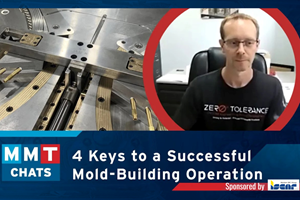The Bottom Line: Identifying the Value Drivers for a Mold Shop
Paying attention to the basic value drivers that promote sustainable growth helps mold shops build value in their businesses.
A unique product or service offering, a reputation for innovation or being the first to market are all ways to create and maintain value in a business. However, for many mold shops, the formula for success is building value the old-fashioned way, in which shops can simply pay attention to the basic value drivers that promote sustainable growth. This article will review some of the internal value drivers that mold shops can control, as well as some external opportunities for value growth.
When assessing the internal value drivers of a business, consider the following:
Cash flow. Cash really is king. A strong, steady cash flow provides shops the ability to weather economic storms and enables them to go “full mast” when they have an economic tailwind. Ready cash is also necessary to fund top talent, research, innovation and growth.
Leadership. Exceptional companies are led by exceptional managers who possess vision and commitment and who are not afraid to make tough decisions. Regardless of size, having a strong bench of senior executives and a succession plan that is well thought-out are critical to maximizing a company’s value when the owner is ready to exit. If a mold shop is considering selling the business, having a strong management team in place gives the shop more options and increases its value.
Performance. Consistently outperforming competitors can earn a shop an edge in terms of the market’s perception of value. A history of strong performance with high gross margins is a big plus, because larger acquirers can often eliminate many operating expenses below the gross margin line. Regularly benchmarking a shop’s results against that of its peers enables a shop to focus on the areas where opportunity for improvement is available. Regular measurement and comparison of these key performance indicators (KPI) is a trait of many successful mold builders.
Customer base. Diversity is critical when it comes to customers. Relying heavily on just a few large customers can lead to big trouble if one of them finds another supplier or experiences financial problems. Along those lines, industry diversity can protect a shop against industry downturns and provide for more flexibility should shop owners want to sell the business.
Supplier strength. A business is sunk without a reliable supply chain, so these relationships must be solid. And, like a customer base, diversity is a plus. When a manufacturer depends too heavily on just a few suppliers, issues like a raw materials delay, a distribution problem or a natural disaster could potentially disrupt the entire business.
Workforce skill and reliability. Attracting highly skilled workers can be critical to a shop’s success, and access to a steady stream of skilled employees is essential for labor-intensive companies or those that require specific skill sets. For mold builders, this may mean investment in local youth and technical programs. Further, continuous improvement and training is a must in today’s technologically-advanced market of moldmaking.
Technology. “If you’re not growing, you’re dying.” Everyone has heard this axiom of the business world, but it is especially relevant for technology-driven manufacturers. A business that is behind the times technologically risks becoming obsolete. Investment in state-of-the-art systems indicates a progressive company that is looking toward the future. Moreover, investment in technology may allow a shop to do more with its existing workforce, enabling its top line to grow faster than its employee count.
Marketing. Establishing a strong brand and a unique selling proposition will distinguish a shop in the crowded marketplace. Is a company a Leadtime Leader Award winner? Has it won Mold Builder of the Year? A company should market and share these accomplishments with its customers and industry peers. Market leaders, which are companies that create demand and consistently deliver on their brand promise, will always have more value than those that lag behind their competition.
Sales. This is where the rubber meets the road in revenue generation. A well-trained and savvy sales force knows its customer base and understands how specific products and services solve problems for particular customers. Simply put, value goes up when risks go down. So, anything that business owners can do to reduce the risks and uncertainties associated with their companies will help to increase the perception of value in the eyes of their potential buyers.
Anything that business owners can do to reduce the risks and uncertainties associated with their companies will help to increase the perception of value in the eyes of their potential buyers.
Other Opportunities. There is an external element related to industry dynamics, economic changes and competitive forces, which creates opportunities and challenges for the business owner. For example, domestic capacity shortfalls in the industry may make a shop and its core competencies more valuable.
The areas listed here only scratch the surface of value drivers for a shop. Each tool shop is unique. Mold builders may face challenges that are similar to the ones facing their peers, but understanding how these value drivers directly impact a business will make a shop more competitive. What is more, understanding these value drivers can provide a shop with additional information that can help the shop make decisions that can greatly improve its value.
About the Author
Christopher Volz, CPA/ABV/CFF, ASA
Christopher B. Volz, CPA/ABV/CFF, ASA is a partner and the director of Valuation Services at Mueller Prost.
Michael J. Devereux II, CPA, CMP
Michael J. Devereux II, CPA, CMP, is a partner and director of Manufacturing, Distribution and Plastics Industry Services at Mueller Prost.
Related Content
Editorial Guidelines: Editorial Advisory Board
The Editorial Advisory Board of MoldMaking Technology is made up of authorities with expertise within their respective business, industry, technology and profession. Their role is to advise on timely issues, trends, advances in the field, offer editorial thought and direction, review and comment on specific articles and generally act as a sounding board and a conscience for the publication.
Read MoreThink Safety: Eliminate Hazards Throughout the Shop
The tooling community is taking advantage of new products for safer mold shops and molding facilities.
Read MoreMMT Chats: 4 Keys to a Successful Mold-Building Operation: Innovation, Transparency, Accessibility and Relationship
MoldMaking Technology Editorial Director Christina Fuges chats with Steve Michon, co-owner of Zero Tolerance in Clinton Township, Michigan, about the excitement of solving problems, the benefits of showing gratitude, the real struggle with delegation and the importance of staying on top of technology. This episode is brought to you by ISCAR with New Ideas for Machining Intelligently.
Read MoreMMT Chats: Solving Schedule and Capacity Challenges With ERP
For this MMT Chat, my guests hail from Omega Tool of Menomonee Falls, Wisconsin, who share their journey with using enterprise resource planning (ERP)—and their people—to solve their schedule and capacity load monitoring challenges.
Read MoreRead Next
How to Use Strategic Planning Tools, Data to Manage the Human Side of Business
Q&A with Marion Wells, MMT EAB member and founder of Human Asset Management.
Read MoreAre You a Moldmaker Considering 3D Printing? Consider the 3D Printing Workshop at NPE2024
Presentations will cover 3D printing for mold tooling, material innovation, product development, bridge production and full-scale, high-volume additive manufacturing.
Read More


















